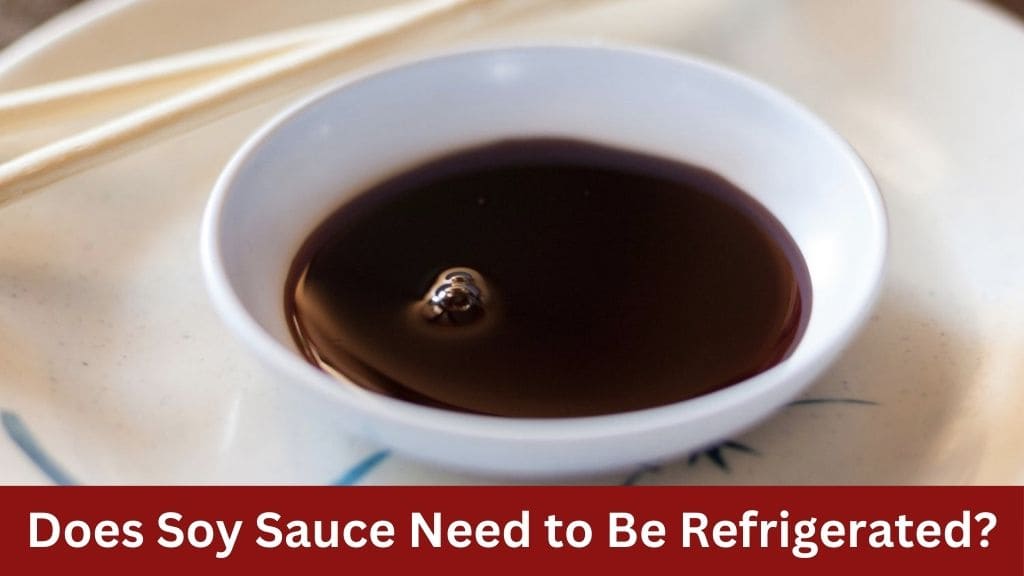Soy sauce, with its rich history and versatile flavor profile, has long been a staple in kitchens around the world. From enhancing the savory depth of Asian dishes to adding a unique twist to Western cuisine, soy sauce is beloved for its ability to elevate a wide range of recipes. However, there’s often confusion surrounding whether soy sauce needs to be refrigerated after opening. In this comprehensive guide, we’ll delve into the factors that influence the need for refrigeration, explore the science behind soy sauce preservation, and provide practical tips for storing this beloved condiment.
Understanding Soy Sauce

What is Soy Sauce?
Soy sauce is a fermented condiment that originated in China over 2,000 years ago. Traditionally made from soybeans, wheat, salt, and fermenting agents, soy sauce undergoes a complex fermentation process that results in its signature flavor profile. The combination of savory umami, salty notes, and a hint of sweetness makes soy sauce a versatile ingredient in various culinary traditions.
Varieties of Soy Sauce
Soy sauce comes in several varieties, each with its own unique characteristics and culinary applications. The two primary types of soy sauce are light soy sauce and dark soy sauce:
- Light Soy Sauce: Light soy sauce, also known as regular soy sauce or thin soy sauce, is lighter in color and thinner in texture compared to its dark counterpart. It has a higher salt content and a more pronounced salty flavor, making it suitable for seasoning dishes and providing a salty kick without darkening the color of the food.
- Dark Soy Sauce: Dark soy sauce is darker in color, thicker in consistency, and has a sweeter, less salty flavor compared to light soy sauce. It undergoes a longer fermentation process and may contain additives such as caramel for color and molasses for sweetness. Dark soy sauce is commonly used in marinades, glazes, and sauces to impart color and depth of flavor to dishes.
Factors Influencing the Need for Refrigeration

1. Fermentation Process
Soy sauce undergoes a fermentation process that not only contributes to its unique flavor but also plays a crucial role in its preservation. During fermentation, microorganisms such as bacteria and yeast break down the proteins and carbohydrates present in soybeans and wheat. This process results in the production of lactic acid and alcohol, which act as natural preservatives.
The acidic environment created by lactic acid inhibits the growth of harmful bacteria, while the alcohol content helps to further preserve the sauce. As a result, properly fermented soy sauce has a relatively long shelf life and is resistant to spoilage, even at room temperature. This natural preservation process is one of the key reasons why soy sauce can be stored safely without refrigeration, particularly if it is used regularly and consumed within a reasonable period.
2. Oxygen Exposure
Once a bottle of soy sauce is opened, it becomes exposed to oxygen, which can impact its flavor and shelf life. Oxygen exposure can lead to oxidation, causing changes in color, aroma, and taste over time. While soy sauce is relatively resistant to spoilage due to its high salt content and acidic pH, prolonged exposure to oxygen can gradually degrade its quality.
Refrigeration helps minimize oxygen exposure by slowing down the chemical reactions that lead to oxidation. Storing soy sauce in a tightly sealed container and keeping it refrigerated can help maintain its freshness and flavor for a longer period, especially if it is not used frequently.
3. Frequency of Use
The need for refrigeration also depends on how frequently soy sauce is used in a household. If soy sauce is used regularly and consumed within a short period, storing it at room temperature is generally acceptable. However, if soy sauce is used infrequently or if you prefer to prolong its shelf life, refrigeration can help preserve its freshness and flavor over an extended period.
Storing Soy Sauce: Best Practices

Unopened Soy Sauce
Before opening, soy sauce should be stored in a cool, dry place away from direct sunlight. The pantry or a kitchen cabinet is an ideal location for storing unopened bottles of soy sauce. It’s essential to ensure that the bottle is tightly sealed to prevent moisture from entering, which could compromise the quality of the soy sauce over time.
By storing unopened soy sauce in a cool and dry environment, you can help maintain its freshness and flavor until it’s ready to be used. Avoid storing soy sauce near sources of heat or moisture, as exposure to these elements can accelerate spoilage and affect the taste and aroma of the sauce.
Opened Soy Sauce
Once opened, soy sauce can be stored either in the pantry or in the refrigerator, depending on personal preference and usage frequency. If you anticipate using soy sauce within a relatively short period, storing it in the pantry is generally acceptable. However, if you use soy sauce infrequently or want to extend its shelf life, refrigeration is recommended.
When storing opened soy sauce in the pantry, ensure that the bottle is tightly sealed to prevent oxidation and maintain freshness. If you choose to refrigerate soy sauce, transfer it to a tightly sealed container to prevent absorption of odors from other foods in the refrigerator. Additionally, check the expiration date on the bottle and discard any soy sauce that has exceeded its shelf life to avoid consuming spoiled or degraded product.
Refrigeration Tips
When refrigerating soy sauce, it’s essential to store it at a consistent temperature to preserve its quality. The refrigerator should be set to a temperature of 40°F (4°C) or below to inhibit bacterial growth and maintain freshness. Avoid placing soy sauce near the door of the refrigerator, as temperature fluctuations can occur, affecting the quality of the sauce.
Furthermore, ensure that the container or bottle of soy sauce is tightly sealed to prevent moisture from entering and compromising its flavor. If using a glass bottle, consider transferring the soy sauce to a plastic or stainless steel container for safer storage in the refrigerator.
Myth vs. Reality: Debunking Common Misconceptions

Myth: Soy Sauce Must Always Be Refrigerated
Reality: One common misconception is that soy sauce must always be refrigerated to prevent spoilage. While refrigeration can help prolong the shelf life of soy sauce and maintain its quality, it is not strictly necessary. Soy sauce is a fermented condiment with natural preservatives that make it resistant to spoilage at room temperature.
The fermentation process of soy sauce produces lactic acid and alcohol, which act as natural preservatives by creating an acidic environment that inhibits the growth of harmful bacteria. As a result, properly fermented soy sauce can safely be stored at room temperature without refrigeration, especially if it is used regularly and consumed within a reasonable period.
Myth: Refrigeration Causes Soy Sauce to Solidify or Lose Flavor
Reality: Another misconception is that refrigeration causes soy sauce to solidify or lose its flavor. While refrigeration may cause soy sauce to become slightly thicker in consistency due to the cold temperature, this does not affect its overall quality or flavor.
In fact, refrigeration can help preserve the freshness and flavor of soy sauce by slowing down oxidation and microbial growth. By storing soy sauce in the refrigerator, you can maintain its quality over a longer period, particularly if you use it infrequently or want to extend its shelf life.
Myth: Once Opened, Soy Sauce Must Always Be Refrigerated
Reality: There is a misconception that once opened, soy sauce must always be refrigerated to prevent spoilage. While refrigeration can help prolong the shelf life of opened soy sauce, it is not strictly necessary, especially if the sauce is used regularly and consumed within a reasonable period.
Soy sauce is relatively resistant to spoilage due to its high salt content and acidic pH, which help inhibit the growth of harmful bacteria. However, refrigeration is recommended for prolonged storage, especially if soy sauce is used infrequently or if you prefer to extend its shelf life beyond the expiration date printed on the bottle.
Conclusion
The decision to refrigerate soy sauce depends on various factors, including personal preference, frequency of use, and storage conditions. While soy sauce can be safely stored at room temperature, refrigeration can help extend its shelf life and maintain its quality over time. By understanding the fermentation process, oxygen exposure, and best storage practices, you can ensure that your soy sauce remains a flavorful and versatile addition to your culinary repertoire. Whether used in stir-fries, marinades, or dipping sauces, soy sauce continues to delight taste buds and enrich dishes with its distinctive flavor profile.





